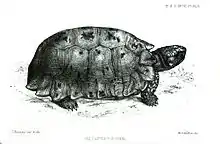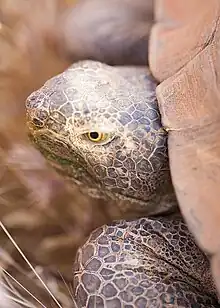Forsten's tortoise
Forsten's tortoise (Indotestudo forstenii), also known commonly as the Sulawesi tortoise, is a species of tortoise in the family Testudinidae. The species is native to Sulawesi Island, Indonesia.
| Forsten's tortoise | |
|---|---|
 | |
| Scientific classification | |
| Domain: | Eukaryota |
| Kingdom: | Animalia |
| Phylum: | Chordata |
| Class: | Reptilia |
| Order: | Testudines |
| Suborder: | Cryptodira |
| Superfamily: | Testudinoidea |
| Family: | Testudinidae |
| Genus: | Indotestudo |
| Species: | I. forstenii |
| Binomial name | |
| Indotestudo forstenii | |
| Synonyms[2] | |
| |
Taxonomy
Forsten's tortoise is one of three tortoise species placed in the genus Indotestudo, the others being the elongated tortoise (I. elongata), and the Travancore tortoise (I. travancorica).
Etymology
The specific name, forstenii, is in honor of Dutch botanist Eltio Alegondas Forsten.[3]
Geographic range
I. forstenii can be found on Sulawesi Island of Indonesia, and its nearby islands such as Halmahera island. In Sulawesi, it is found in the central and northern parts of the island.[4]
In North Sulawesi, it is found in Mount Boliahutu and around Buol, while in Central Sulawesi, it is found in Santigi, Morowali Reserve, Palu Valley, Kulawi Valley, Bora Village near Gimpu, and along the western border of Lore Lindu National Park.[5]
Reproduction
I. forstenii is oviparous.[6] Sexually mature females lay clutches of eggs throughout the year. Each clutch consists of one or two eggs.[1]
Gallery
 Baby Forsten's tortoise
Baby Forsten's tortoise
See also
- Sulawesi forest turtle (Leucocephalon yuwonoi) – another threatened turtle endemic to Sulawesi, Indonesia.
References
- Kusrini, M.D.; As-singkily, M.; Light, C.; Stanford, C.B. (2021). "Indotestudo forstenii ". IUCN Red List of Threatened Species. 2021: e.T10825A499158. doi:10.2305/IUCN.UK.2021-2.RLTS.T10825A499158.en. Retrieved 19 November 2021.
- Fritz, Uwe; Havaš, Peter (2007). "Checklist of Chelonians of the World" (PDF). Vertebrate Zoology. 57 (2): 284. doi:10.3897/vz.57.e30895. ISSN 1864-5755. S2CID 87809001. Archived from the original (PDF) on 2011-05-01. Retrieved 29 May 2012.
- Beolens, Bo; Watkins, Michael; Grayson, Michael (2011). The Eponym Dictionary of Reptiles. Baltimore: Johns Hopkins University Press. xiii + 296 pp. ISBN 978-1-4214-0135-5. (Indotestudo forstenii, p. 92).
- Turtle Taxonomy Working Group [ Rhodin AGJ, Iverson JB, Bour R, Fritz U, Georges A, Shaffer HB, van Dijk PP ]. (2017). "Turtles of the World: Annotated Checklist and Atlas of Taxonomy, Synonymy, Distribution, and Conservation Status (8th Edition)". In: Rhodin AGJ, Iverson JB, van Dijk PP, Saumure RA, Buhlmann KA, Pritchard PCH, Mittermeier RA (editors) (2017). "Conservation Biology of Freshwater Turtles and Tortoises: A Compilation Project of the IUCN/SSC Tortoise and Freshwater Turtle Specialist Group". Chelonian Research Monographs 7: 1–292. doi:10.3854/crm.7.checklist.atlas.v8.2017
- Harvest sustainability of Sulawesi tortoise Indotestudo forstenii in Indonesia
- Species Indotestudo forstenii at The Reptile Database www.reptile-database.org.
Further reading
- Boulenger GA (1907). "A new tortoise from Travancore". Journal of the Bombay Natural History Society 17: 560–564.
- Iverson JB, Spinks PQ, Shaffer HB, McCord WP, Das I (2001). "Phylogenetic relationships among the Asian tortoises of the genus Indotestudo (Reptilia: Testudines: Testudinidae)". Hamadryad 26 (2): 271–274.
- Pritchard PCH (2000). "Indotestudo travancorica. A Valid Species of Tortoise?" Reptile & Amphibian Hobbyist 5 (2): 18–28.
- Radhakrishnan C (1998). "Additional record of the travancore tortoise, Indotestudo forstenii (Schlegel & Müller) (Testudinita: Reptilia) in Kerala". Cobra 34 (Oct.–Dec.): 19–20.
- Schlegel H, Müller S (1845). "Over de Schildpadden van den Indischen Archipel ". pp. 29–36. In: Temminck CJ (1839–1847) Verhandelingen over de Natuurlijke Geschiedenis der Nederlandische overzeesche bezittingen, door de leden der Natuurkundige Commisië in Oost-Indie en andere Schrijvers. Part 3, Zoologie, Schildpadden. Leiden: Luchtmans and van der Hoek. (Testudo forstenii, new species). (in Dutch).
External links

